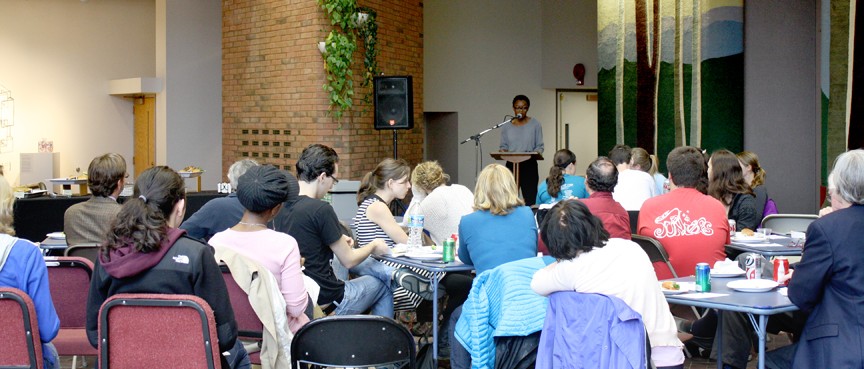Photo by Tatianna Troxell ’16
Emily Dickinson once wrote, “If I feel physically as if the top of my head were taken off, I know that is poetry.” If you wandered through the Williams Center for the Arts this past Tuesday during the ninth annual “Favorite Poem Reading,” perhaps you noticed 40 beheaded corpses sprawled across the floor of the auditorium.
If you are going to attend a campus event alone, make it a poetry reading. It’s a self-fulfilling prophecy if anything, honestly, because most of your friends are probably callous, heartless people immune to sensitivity. You know, the ones who would rather indulge in Wawa than E.E Cummings.
Karen Danna’s spoofed reading of “This Is Just To Say,” by William Carlos Williams, highlights the beret-wearing, wounded character of the modern poet (that no one actually is) particularly well. Perhaps you remember this bad boy from high school English class. It goes: “I have eaten/ the plums/ that were in/ the icebox/ and which/ you were probably/ saving/ for breakfast/ Forgive me/ they were delicious/ so sweet/ and so cold.”
Danna, with a background in the sociology of humor, subsequently quipped her reading with a spoof pulled from Twitter: “This is just to say, I’m tired of sharing an apartment with William Carlos Williams.” 140 characters or less can raise quite a chuckle from English nerds.
Along with demonstrating several stints of humor, numerous pieces were delightfully deep. Although the pulling of heartstrings is expected to be elicited by a poetry reading, it nonetheless was proved impossible to listen to Elizabeth Mattison’s reading of “Aristotle,” by Billy Collins, without furling a sly smile in response to the piece’s unabashed vitality. “This is the thick of things…what everything comes down to,/ the destination we cannot help imagining,/ a streak of light in the sky…” Mattison eloquently quoted the rich verse of Collins’ work.
The Favorite Poem Reading honored the overall spirit of National Poetry Month with remarkable execution. The motley crew of poets and fans of poetry present at the event represented all walks of life. The special opportunity to view several classmates and familiar faces recite renowned verse served as a reminder of the ideal of poetry as a commoner’s art. In truth, it did not take “much” for Shakespeare to simply sit down with a quill and write. Poetry readings such as this one, however, offer a model of pleasurable prose with enough power to feel like magic and shape our perception of the world.




















































































































